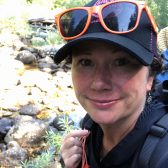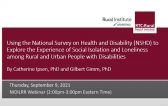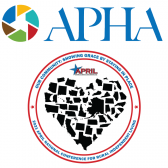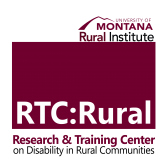|
| |
Barriers to community start at home
A new paper from RTC:Rural and the University of Kansas looks at how steps at home impact community participation for people with mobility impairments.
|
|
|
|
|
|
| |
New grant to address social isolation
A new grant from NIDILRR will go to support the Get Connected project, which will work to reduce social isolation and build peer networks among people with disabilities.
|
|
|
|
|
|
| |
Tools for disaster planning
RTC:Rural reminds people they can use maps and data tools to understand where people with disabilities live for planning and response to natural disasters, such as Hurricane Ida.
|
|
|
|
|
|
| |
Presentation video available
An archived video of Dr. Catherine Ipsen and Dr. Gilbert Gimm's presentation “Using the National Survey on Health and Disability (NSHD) to Explore the Experience of Social Isolation and Loneliness among Rural and Urban People with Disabilities” - part of NIDILRR's social isolation series - is now available.
|
|
|
|
|
|
| |
Rural disability research leader retires
Dr. Craig Ravesloot will retire after working for 33 years at the Rural Institute for Inclusive Communities as a disability researcher, leading projects and building programs to improve the quality of life of people with disabilities.
|
|
|
|
|
|
| |
Upcoming conferences
RTC:Rural staff will be presenting at the upcoming APRIL Conference (Oct. 18-22) and APHA Conference (Oct. 24-27) on various disability topics, so please register and attend if you can!
|
|
|
|
|
|
| |
The Research and Training Center on Disability in Rural Communities (RTC:Rural) conducts research on disability as part of the Rural Institute for Inclusive Communities at the University of Montana.
RTC:Rural is funded by the National Institute on Disability, Independent Living and Rehabilitation Research (NIDILRR) grant number 90RTCP0002 to improve the ability of people with disabilities to engage in rural community living.
|
|
|
|
|
|








